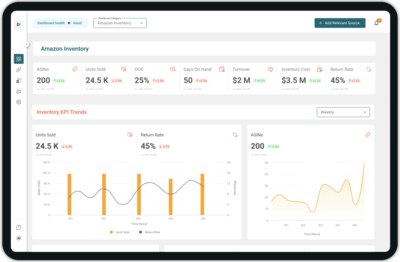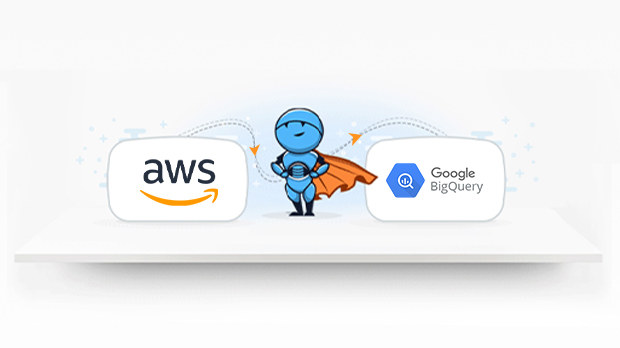Replicate Amazon S3 to Google BigQuery in minutes
Do you want a quick and simple way to transfer data from Amazon S3 to Google BigQuery? If yes, then try replicating Amazon S3 data with an efficient ETL tool: Daton.
Businesses need to understand their data to stay ahead of increasing competition in this competitive landscape. The tons of data generated from various apps require fast and secured storage. Unfortunately, a scalable, fast and secure physical storage solution is expensive to build and maintain. So, cloud storage solutions like Amazon S3 are becoming popular. They provide secure virtual storage solutions.
The multiple data silos from apps used in the business need to be consolidated to get a complete sense of the business. But manual data integration is complex, inaccurate, and time-consuming. As a result, data-savvy companies are reducing the time & effort of reporting and analyzing their multiple data silos by integrating these massive amounts of data present in different sheets, CSV files, cloud storage to data warehouses like Google BigQuery.
Why integrate Amazon S3 to Google BigQuery
Modern enterprises use cloud storage solutions like Amazon S3 to consolidate their data. These storage solutions facilitate collaboration, especially for teams working in offices across different countries. The data will also be backed up automatically by secure servers, reducing data theft and loss. Combine data from Amazon S3 with inventory, customer behavior, sales and billing data to simplify data analysis and reporting. However, manual data consolidation takes much time to execute manually, and often the reports are inaccurate. Thus, top companies use ETL tools like Daton to replicate Amazon S3 to Google BigQuery. It is a highly automated ETL Tool that easily replicates data from different data sources to cloud data warehouses without coding.
Amazon S3 Overview
Amazon Simple Storage Service (Amazon S3) is a cloud-based storage solution by Amazon Web Services (AWS). It provides data availability, security, performance ,and scalability. Amazon S3 is great for data querying and data transfer, storage management and monitoring, access management and security. Organizations of any size can use it to store and protect volumes of data for websites, enterprise applications, IoT devices, data analysis, backup, and restore. Amazon S3 also offers management features for organizing data and configuring access controls to meet business, organizational, and compliance requirements. Amazon Glacier is the lowest-cost option intended for long-term backup and storage. Then there is standard Amazon S3 for companies with complex data requirements. Amazon S3 has free storage options for the first 5 GB of data.
Google Bigquery Overview
Google BigQuery is the first serverless data warehouse service that was available in the market. A database administrator architects the schema and optimize the partitions for performance and cost in a Google BigQuery environment. This cloud service automatically scales to fulfil any demands of a query. Google BigQuery service offers an excellent pricing model based on the amount of data processed by incoming queries, not on the storage or the compute capacity for processing queries. The best part about using Google BigQuery is that you can instantly load data to the service as soon as you start using it. The primary requirements are a mechanism to load data into the data warehouse and the ability to write SQL queries.
How to replicate Amazon S3 to Google BigQuery
There are two ways in which you can replicate Amazon S3 to Google BigQuery.
Build Your data pipeline – Building an in-house data pipeline needs a lot of experience, time and manpower with higher chances of errors. You need to extract data using Amazon S3 APIs & then connect it properly with the Google BigQuery data warehouse.
Use Daton to integrate Amazon S3 & Google BigQuery – Using Daton to integrate Amazon S3 & Google BigQuery is the fastest & easiest way to save your time and efforts. Leveraging an eCommerce data pipeline like Daton simplifies and accelerates the time to build automated reporting to a great extent.
Configuring data replication on Daton only takes a few minutes and a few clicks. Analysts do not have to write any code or manage any infrastructure, yet they can get access to their Amazon ads data in a few hours. Daton’s simple and easy-to-use interface allows analysts and developers to use UI elements to configure data replication from Amazon S3 data into Google BigQuery.
Daton takes care of:
- Authentication
- Rate limits,
- Table creation, deletion & reloads
- Refreshing access tokens,
- Sampling,
- Historical data load,
- Incremental data load,
- Notifications
and many more important functions for data analysts to focus on analysis rather than worry about the data replication process.
Steps to Integrate Amazon S3 with Daton

- Sign in to Daton
- Select Amazon S3 from Integrations page
- Provide Integration Name, Replication Frequency, and History. The integration name would be used in creating tables for the integration and cannot be changed later
- You will be redirected to Amazon S3 login for authorizing Daton to extract data periodically
- Post successful authentication, you will be prompted to choose from the list of available Amazon S3 Ad accounts
- Select required tables from the available list of tables
- Then select all required fields for each table
- Submit the integration
For more information visit Amazon S3 Connector.
Sign up for a trial of Daton Today!
Here are more reasons to explore Daton for Amazon S3 to Google BigQuery Integration
- Faster Integration of Amazon S3 to Google BigQuery– Amazon S3 to Google BigQuery is one of the integrations Daton can handle very fast and seamlessly. By following a few steps, you can easily connect Amazon S3 to Google BigQuery.
- Robust Scheduling Options: this allows you to schedule jobs based on their requirements using a simple configuration step.
- Low Effort & Zero Maintenance – Daton automatically takes care of all the data replication processes and infrastructure once you sign up for a Daton account and configure the data sources. There is no infrastructure to manage or no code to write.
- Data consistency guarantee and an incredibly friendly customer support team ensure you can leave the data engineering to Daton and focus instead of analysis and insights!
- Enterprise-grade data pipeline at an unbeatable price to help every business become data-driven. Get started with a single integration today for just $10 and scale up as your demands increase.
- Support for all major cloud data warehouses including Snowflake, Google BigQuery, Amazon Redshift, Oracle Autonomous Data Warehouse, PostgreSQL, and more.
- Flexible loading options allow to you optimize data loading behavior to maximize storage utilization and ease of querying.
- Enterprise grade encryption gives your peace of mind
- Support for 100+ data sources – In addition to Amazon S3, Daton can extract data from a varied range of sources such as Sales and Marketing applications, Databases, Analytics platforms, Payment platforms, and much more. Daton will ensure that you have a way to bring any data to Google BigQuery and generate relevant insights.
For all sources, check our data connectors page.
Other Articles by Saras,
- How to Choose the Right Data Warehouse
- Data Migration Tips
- Build a data warehouse with Daton and Google BigQuery for $200
- eCommerce Data Blending
- Tag Monitoring & Resolution
- What is Amazon S3, and why is it becoming popular among modern enterprises?Amazon S3 is a cloud-based storage solution by Amazon Web Services (AWS) that provides data availability, security, performance, and scalability. Modern enterprises use cloud storage solutions like Amazon S3 to consolidate their data, facilitating collaboration, especially for teams working in offices across different countries. The data will also be backed up automatically by secure servers, reducing data theft and loss.
- What is Google BigQuery, and what are its benefits?Google BigQuery is the first serverless data warehouse service available in the market that automatically scales to fulfil any demands of a query. The cloud service offers an excellent pricing model based on the amount of data processed by incoming queries, not on the storage or the computing capacity for processing queries. The best part about using Google BigQuery is that you can instantly load data to the service as soon as you start using it. The primary requirements are a mechanism to load data into the data warehouse and the ability to write SQL queries.
- Why should businesses integrate Amazon S3 to Google BigQuery?Manual data consolidation takes much time to execute manually, and often the reports are inaccurate. Thus, top companies use ETL tools like Daton to replicate Amazon S3 to Google BigQuery. It is a highly automated ETL Tool that easily replicates data from different data sources to cloud data warehouses without coding. Combining data from Amazon S3 with inventory, customer behavior, sales, and billing data can simplify data analysis and reporting.
- What is Daton, and how does it help replicate data from Amazon S3 to Google BigQuery?Daton is an efficient ETL tool that simplifies data integration. Configuring data replication on Daton only takes a few minutes and a few clicks, and analysts do not have to write any code or manage any infrastructure. Daton takes care of Authentication, Rate limits, Table creation, deletion & reloads, Refreshing access tokens, Sampling, Historical data load, Incremental data load, Notifications, and many more important functions for data analysts to focus on analysis rather than worry about the data replication process.
- What are the steps to integrate Amazon S3 with Daton?To integrate Amazon S3 with Daton, you need to sign in to Daton, select Amazon S3 from the Integrations page, and provide Integration Name, Replication Frequency, and History. You will then be redirected to Amazon S3 login for authorizing Daton to extract data periodically. Post successful authentication, you will be prompted to choose from the list of available Amazon S3 Ad accounts, select required tables from the available list of tables, then select all required fields for each table, and finally submit the integration.
















